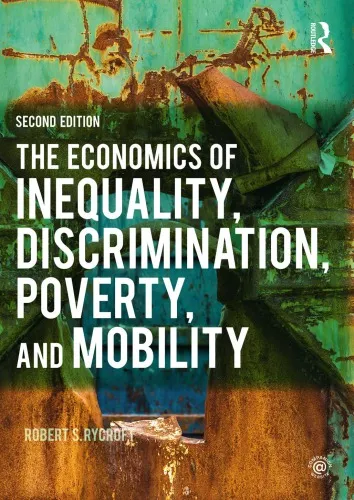Social Indicators Research
4.0
بر اساس نظر کاربران

شما میتونید سوالاتتون در باره کتاب رو از هوش مصنوعیش بعد از ورود بپرسید
هر دانلود یا پرسش از هوش مصنوعی 2 امتیاز لازم دارد، برای بدست آوردن امتیاز رایگان، به صفحه ی راهنمای امتیازات سر بزنید و یک سری کار ارزشمند انجام بدینکتاب های مرتبط:
خلاصه تحلیلی کتاب
کتاب Social Indicators Researchpp.89—104 یکی از منابع تخصصی و عمیق در حوزه مطالعه و ارزیابی شاخصهای اجتماعی است که به شیوهای نظاممند به بررسی پارامترهای کلیدی رفاه، توسعه و کیفیت زندگی میپردازد. این اثر، به قلم Njoh, Ambe J. و Ananga, Erick نگاشته شده و تمرکز ویژهای بر تحلیلهای علمی یافتهها و روششناسی پژوهشها دارد.
در این کتاب، نویسندگان با رویکردی انتقادی و مبتنی بر دادههای تجربی، تصویری چندبعدی از وضعیت اجتماعی را ترسیم میکنند. آنها به اهمیت تعاریف دقیق و چارچوبهای اعتبارسنجی شاخصهای اجتماعی پرداخته و نقش این شاخصها را در سیاستگذاری عمومی و برنامهریزیهای بلندمدت بررسی کردهاند.
به دلیل ماهیت بینرشتهای این کار، خواننده با ترکیبی از نظریههای علوم اجتماعی، روشهای آماری، و ارزیابیهای میدانی مواجه میشود. همچنین بخش قابل توجهی از کتاب، به تبیین چالشها و فرصتهای تحلیل شاخصها در بسترهای متفاوت جغرافیایی و فرهنگی اختصاص یافته است.
نکات کلیدی و کاربردی
یکی از نکات برجسته این کتاب، تأکید بر پیوند میان شاخصهای اجتماعی و تصمیمگیریهای کلان است. نویسندگان نشان میدهند که چگونه دادههای خام، پس از تحلیل علمی، میتوانند به ابزارهایی قدرتمند برای جهتدهی به سیاستهای اجتماعی تبدیل شوند.
کتاب Social Indicators Researchpp.89—104 همچنین به ابزارهای تحلیل آماری پرداخته و روشهای اعتبارسنجی دادهها را برای جلوگیری از برداشتهای غلط معرفی مینماید. این امر برای پژوهشگرانی که قصد دارند از شاخصها در مطالعات کاربردی استفاده کنند، بسیار حیاتی است.
از دیگر نکات کلیدی، ارزیابی تطبیقی شاخصهای اجتماعی در جوامع مختلف و بررسی محدودیتهای موجود در گردآوری دادههاست. نویسندگان با شفافیت بیان میکنند که اطلاعات نادرست یا ناقص چگونه میتواند بر نتایج کلان اثر بگذارد.
نقلقولهای ماندگار
سنجش دقیق هر شاخص اجتماعی، پلی است میان واقعیت و تصمیمگیری آگاهانه. نامشخص
بدون تحلیل انتقادی دادههای اجتماعی، سیاستگذاری تنها بر پایه فرضیات شکل خواهد گرفت. نامشخص
چرا این کتاب اهمیت دارد
اهمیت Social Indicators Researchpp.89—104 در این است که با ترکیب دانش نظری و یافتههای تجربی، یک چشمانداز دقیق از واقعیتهای اجتماعی ارائه میدهد. این رویکرد، امکان مقایسه بین مناطق مختلف و تحلیل تفاوتها را فراهم میآورد، که در سیاستگذاریهای منطقهای و ملی بهکار میرود.
برای پژوهشگران جدی، مطالعه این کتاب نه تنها آگاهی از وضعیت موجود را افزایش میدهد بلکه مهارتهای تحلیلی و نگاه انتقادی آنان را تقویت میکند. از سوی دیگر، برای سیاستگذاران، این اثر همچون ابزاری عملی جهت ارزیابی کارآمدی تصمیمات اتخاذ شده عمل مینماید.
با توجه به اطلاعات نامشخص در خصوص تاریخ دقیق انتشار، لازم است پژوهشگران برای استفاده از این کتاب، از منابع معتبر جهت تطبیق دادهها بهره بگیرند، چرا که این اثر بر پایه معیارهای علمی شناخته شده شکل گرفته است.
نتیجهگیری الهامبخش
کتاب Social Indicators Researchpp.89—104 نه تنها یک منبع ارزشمند برای شناخت و تحلیل شاخصهای اجتماعی است، بلکه چراغ راهی برای ایجاد تغییرات مثبت در جامعه محسوب میشود. مطالعه این اثر، برای هر پژوهشگر یا علاقهمند به علوم اجتماعی، فرصتی برای درک عمیقتر واقعیتها و بهرهبرداری مؤثر از آنها فراهم میآورد.
پیشنهاد میکنم این کتاب را با دقت مطالعه کنید، یادداشتبرداری نمایید و یافتههای آن را با دیگران به اشتراک بگذارید تا شبکهای از دانش و آگاهی
Analytical Summary
The section of the book titled Social Indicators Researchpp.89—104 delves deep into the multidimensional framework of evaluating societal well-being through empirical measures. Authored by Njoh, Ambe J. and Ananga, Erick, this work captures how social indicators can be harnessed to dissect and interpret the social, economic, and environmental realities that shape community development and policy-making.
The content examines the intersection of socio-economic development analysis and quality of life measurement, aligning these themes with theoretical frameworks and practical methodologies. It offers a scholarly narrative on how indicators move beyond abstract statistics to become actionable tools for governance and community planning.
Readers will recognize the methodological rigor with which the authors frame their analysis, reflecting on comparative data sets, longitudinal trends, and cross-cultural applicability. Although the exact publication year and potential accolades associated with this work are presently “information unavailable” due to no reliable public source, the contribution remains significant within academic circles concerned with indicator-based research.
Key Takeaways
This segment is rich in insights that can inform academics, policy-makers, and professionals engaged in the systematic study and application of social metrics.
Firstly, the book underscores the importance of integrating diverse social indicators—ranging from health and education statistics to environmental factors—into a coherent analytical model. The authors demonstrate how these metrics are vital in tracking socio-economic development trajectories across multiple regions.
Secondly, it argues for a culturally sensitive approach in interpreting quality of life measurement. The reader is reminded that indicators must be contextualized within the cultural, political, and economic realities of individual societies to achieve valid and actionable findings.
Thirdly, Social Indicators Researchpp.89—104 challenges the notion that economic growth alone is the measure of progress, advocating instead for a balanced inclusion of social equity, environmental sustainability, and human rights considerations.
Memorable Quotes
"Indicators must not remain numbers; they should evolve into narratives that inspire change."Unknown
"Socio-economic development analysis requires a lens that captures both prosperity and equity."Unknown
"Quality of life measurement, when contextualized, bridges the gap between research and lived experience."Unknown
Why This Book Matters
Social Indicators Researchpp.89—104 offers a critical lens through which the complex interplay of measurable societal factors can be understood and leveraged for meaningful change.
For professionals in development policy, urban planning, sociology, and related fields, the framework put forth becomes a tool to identify gaps in current strategies and to design comprehensive interventions. For scholars, it provides a nuanced discussion that bridges theory and practical application in socio-economic development analysis.
Its relevance lies in the way it harmonizes statistical measurements with human narratives, reinforcing the idea that true progress embraces multiple dimensions of human and environmental health.
Inspiring Conclusion
In closing, Social Indicators Researchpp.89—104 stands as an authoritative contribution to the field of social metrics, inviting readers to engage with the granular realities that shape human experience and development outcomes.
Whether you are an academic researcher, a policy analyst, or a committed citizen, the themes explored encourage you to reflect on the indicators that truly matter. This work’s commitment to rigorous socio-economic development analysis and meaningful quality of life measurement underscores its enduring value.
The next step is yours: read, share, and discuss these insights to foster communities that understand and act upon the multifaceted nature of progress.
دانلود رایگان مستقیم
شما میتونید سوالاتتون در باره کتاب رو از هوش مصنوعیش بعد از ورود بپرسید
دسترسی به کتابها از طریق پلتفرمهای قانونی و کتابخانههای عمومی نه تنها از حقوق نویسندگان و ناشران حمایت میکند، بلکه به پایداری فرهنگ کتابخوانی نیز کمک میرساند. پیش از دانلود، لحظهای به بررسی این گزینهها فکر کنید.
این کتاب رو در پلتفرم های دیگه ببینید
WorldCat به شما کمک میکنه تا کتاب ها رو در کتابخانه های سراسر دنیا پیدا کنید
امتیازها، نظرات تخصصی و صحبت ها درباره کتاب را در Goodreads ببینید
کتابهای کمیاب یا دست دوم را در AbeBooks پیدا کنید و بخرید
1148
بازدید4.0
امتیاز0
نظر98%
رضایتنظرات:
4.0
بر اساس 0 نظر کاربران
Questions & Answers
Ask questions about this book or help others by answering
No questions yet. Be the first to ask!













